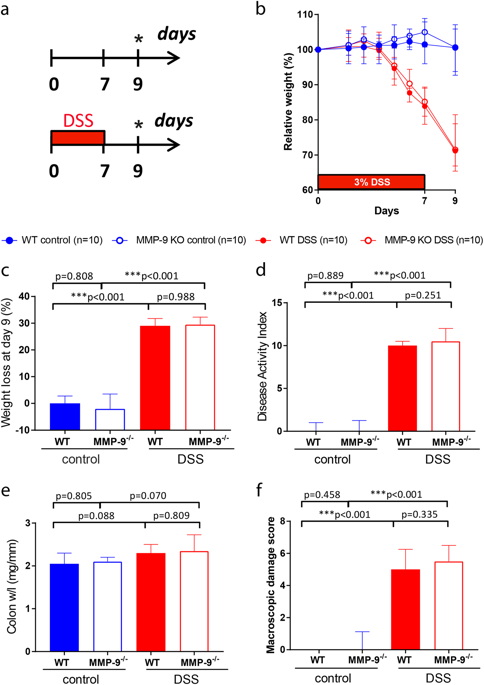npj Biofilms and Microbiomes ( IF 7.8 ) Pub Date : 2018-09-03 , DOI: 10.1038/s41522-018-0059-0 Magali de Bruyn , João Sabino , Doris Vandeputte , Séverine Vermeire , Jeroen Raes , Ghislain Opdenakker

|
Gut microbiota help to educate the immune system and a number of involved immune cells were recently characterized. However, specific molecular determinants in these processes are not known, and, reciprocally, little information exists about single host determinants that alter the microbiota. Gelatinase B/matrix metalloproteinase-9 (MMP-9), an innate immune regulator and effector, has been suggested as such a host determinant. In this study, acute colitis was induced in co-housed MMP-9-/- mice (n = 10) and their wild-type (WT) littermates (n = 10) via oral administration of 3% dextran sodium sulfate (DSS) for 7 days followed by 2 days of regular drinking water. Control mice (10 WT and 10 MMP-9-/-) received normal drinking water. Fecal samples were collected at time of sacrifice and immediately frozen at −80 °C. Microbiota analysis was performed using 16S rRNA amplicon sequencing on Illumina MiSeq and taxonomic annotation was performed using the Ribosomal Database Project as reference. Statistical analysis correcting for multiple testing was done using R. No significant differences in clinical or histopathological parameters were found between both genotypes with DSS-induced colitis. Observed microbial richness at genus level and microbiota composition were not significantly influenced by host genotype. In contrast, weight loss, disease activity index, cage, and phenotype did significantly influence the intestinal microbiota composition. After multivariate analysis, cage and phenotype were identified as the sole drivers of microbiota composition variability. In conclusion, changes in fecal microbiota composition were not significantly altered in MMP-9-deficient mice compared to wild-type littermates, but instead were mainly driven by DSS-induced colonic inflammation.
中文翻译:

比较野生型和明胶酶B /基质金属蛋白酶9缺乏症小鼠在急性DSS诱发的结肠炎中肠道菌群的特征
肠道菌群有助于教育免疫系统,最近对许多参与的免疫细胞进行了表征。但是,这些过程中的特定分子决定簇是未知的,并且相反,关于改变微生物群的单个宿主决定簇的信息很少。明胶酶B /基质金属蛋白酶9(MMP-9)是先天性的免疫调节剂和效应物,已被认为是这种宿主决定因素。在这项研究中, 通过口服3%右旋糖酐硫酸钠(DSS)在共同饲养的MMP-9 -/-小鼠(n = 10)及其野生型(WT)同窝仔(n = 10)中诱发了急性结肠炎。持续7天,然后再喝2天常规饮用水。对照小鼠(10 WT和10 MMP-9 -/-)接受了正常的饮用水。处死时收集粪便样品,并立即在-80°C下冷冻。在Illumina MiSeq上使用16S rRNA扩增子测序进行微生物群分析,并使用核糖体数据库项目作为参考进行分类注释。使用R完成了校正多项测试的统计分析。在两种基因型与DSS诱发的结肠炎之间,在临床或组织病理学参数上均未发现显着差异。在属水平上观察到的微生物丰富度和微生物群组成不受宿主基因型的显着影响。相反,体重减轻,疾病活动指数,笼子和表型确实显着影响肠道菌群组成。经过多元分析后 笼子和表型被确定为微生物群组成变异的唯一驱动力。总之,与野生型同窝仔相比,MMP-9缺陷型小鼠的粪便微生物群组成没有明显改变,而是主要由DSS诱导的结肠炎症驱动。











































 京公网安备 11010802027423号
京公网安备 11010802027423号